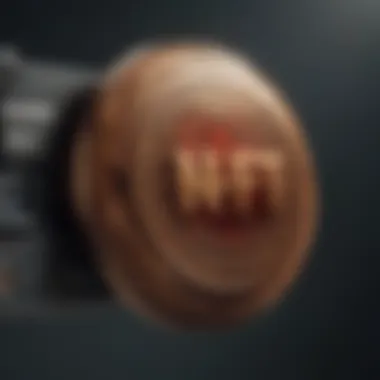Unlocking the Enigmatic World of Upcoming NFT Games


What is NFT Game Upcoming:
In the dynamic realm of upcoming NFT (Non-Fungible Token) games, it is essential to grasp the essence of what defines them. These innovative games are brought to life by a multitude of creators within the blockchain and gaming spheres. Developers and visionaries from various backgrounds converge to craft these unique experiences that blur the lines between digital ownership and traditional gaming.
With a plethora of NFT games emerging, each offering its own distinctive approach and style, players have a vast array of options to explore. From collectible card games to virtual real estate platforms, the diversity in game genres ensures there is something for every gaming enthusiast within this futuristic landscape.
While the primary function of NFT games is to provide users with entertainment and engaging gameplay, they also serve as a gateway to the world of blockchain technology and decentralized finance. By incorporating NFTs, these games empower players to truly own their in-game assets, fostering a sense of authenticity and value in the virtual space.
The utility of NFTs within these games extends beyond mere digital collectibles; they can represent anything from virtual items and characters to land deeds and exclusive memberships. This versatility allows players to not only enjoy immersive gaming experiences but also participate in decentralized economies where their assets hold tangible value.
Tokenomics play a pivotal role in shaping the economic models of NFT games. The tokenomics of an NFT game upcoming are intricately linked to various tokens, including utility tokens for in-game purchases, governance tokens for community voting, and reward tokens for incentivizing player engagement. These interconnected tokens form the backbone of the game's ecosystem, driving its economy and incentivizing user participation.
As part of the NFT game upcoming ecosystem, players can utilize a range of tools and platforms to interact with the game and manage their assets. Metaverse marketplaces, decentralized exchanges, and NFT wallets are among the essential tools that facilitate the buying, selling, and trading of in-game assets, providing players with a seamless and secure experience.
When it comes to acquiring NFTs within these games, the concept of swapping takes precedence over traditional trading. Swapping involves exchanging one type of NFT for another based on preset conditions or parameters, allowing players to diversify their collections and explore new opportunities within the game. This contrasts with conventional trading, where assets are exchanged for currency or other goods.
To purchase NFTs in an upcoming game, players can typically access dedicated marketplaces or platforms that specialize in NFT trading. By connecting their digital wallets and engaging with the decentralized ecosystem, players can browse, bid on, and acquire the NFTs that align with their preferences and strategic goals. with care and precision to capture its essence authentically.
Introduction
In this article, we will delve into the fascinating realm of upcoming NFT (Non-Fungible Token) games, exploring the intricate fusion of blockchain technology, gaming dynamics, and digital ownership. As the digital landscape continues to evolve rapidly, the emergence of NFT games represents a groundbreaking intersection that is reshaping the future of gaming. This section will shed light on the latest trends and developments in the NFT gaming space, offering insights into the potential impact these innovative games may have on the broader gaming industry.
Understanding NFTs
The concept of NFTs
The concept of NFTs stands at the core of the digital revolution, revolutionizing ownership and authenticity in the online world. NFTs are unique digital assets that are indivisible, indestructible, and irreplaceable, guaranteeing ownership through blockchain technology. This aspect of non-fungibility distinguishes NFTs from other digital assets, providing unparalleled exclusivity and provenance. In the context of this article, understanding the concept of NFTs is crucial for grasping the fundamental shifts and opportunities they present within the gaming sector. While NFTs offer unparalleled ownership and traceability benefits, they also raise concerns around scalability and environmental impact, aspects crucial to consider in the evolving landscape of NFT games.
NFTs in the gaming industry
Within the gaming industry, NFTs have sparked a revolution by enabling true ownership of in-game assets and fostering a thriving ecosystem of player-driven economies. By integrating NFTs into gaming experiences, developers empower players to own, trade, and monetize unique items, creating new avenues for engagement and value creation. The presence of NFTs in the gaming sector not only enhances the player experience but also opens up novel revenue streams for developers. However, the adoption of NFTs in gaming also presents challenges related to regulatory compliance, user experience, and market saturation, indicating a nuanced landscape that demands strategic navigation and innovation from industry stakeholders.
Growth of NFT Games


Rise in popularity
The meteoric rise in popularity of NFT games signifies a paradigm shift in how players interact with digital content and assets. This surge is fueled by the promise of true ownership, scarcity, and player-centric economies that NFTs bring to gaming experiences. As players increasingly seek meaningful interactions and value in their gameplay, NFT games offer a unique proposition that transcends traditional gaming models. The rise in popularity of NFT games underscores a fundamental shift towards player empowerment, creativity, and investment within the gaming ecosystem.
Impact on the gaming landscape
The impact of NFT games on the gaming landscape is multifaceted, reshaping the traditional paradigms of game development, distribution, and monetization. By introducing blockchain technology and decentralized features, NFT games enhance security, transparency, and player control over digital assets. Moreover, the tokenization of in-game assets through NFTs unlocks dynamic monetization strategies, enabling players to capture real-world value from their virtual possessions. However, this transformative impact also brings about challenges related to scalability, user adoption, and regulatory compliance, urging industry players to navigate a complex landscape with foresight and innovation.
Exploring Upcoming NFT Games
Gameplay Innovations
Interactive elements
Interactive elements within upcoming NFT games provide a unique gaming experience where players can directly engage with in-game assets, affecting gameplay outcomes and asset value. This interactive feature not only enhances player immersion but also introduces an element of unpredictability and personalization, making each gaming session unique. The seamless integration of interactive elements fosters a dynamic gaming environment, where player decisions directly influence in-game dynamics, fostering creativity and engagement. However, the challenge lies in balancing player agency with maintaining game integrity to ensure a fair and rewarding gaming experience.
Decentralized features
Decentralized features in upcoming NFT games offer increased transparency, security, and ownership of in-game assets through blockchain technology. By leveraging decentralized networks, players can securely trade, purchase, and monetize their in-game assets without intermediaries. The decentralized nature ensures that the value and ownership of digital assets are safeguarded, providing a sense of digital sovereignty to players. However, the decentralized model also presents challenges related to scalability, interoperability, and user adoption, which developers must address to create a seamless gaming experience.
Integration of Blockchain
Enhancing security
Enhancing security through blockchain integration in upcoming NFT games enhances trust among players by offering immutable records of asset ownership and transactions. Blockchain's cryptographic principles ensure that in-game assets are secure from fraudulent activities, enhancing player confidence in the authenticity and scarcity of digital assets. The tamper-resistant nature of blockchain technology mitigates risks associated with traditional centralized systems, providing a robust security layer for in-game asset management. However, the complex nature of blockchain implementation requires developers to strike a balance between security and user accessibility to drive widespread adoption.
Tokenization of in-game assets
The tokenization of in-game assets within NFT games enables fractional ownership, easy transferability, and provable scarcity of digital assets, revolutionizing the concept of virtual ownership. By tokenizing in-game assets, players can securely trade and monetize their assets on blockchain-based marketplaces, unlocking new avenues for value creation and economic participation. The tokenized assets also allow developers to implement innovative ownership models, such as stakeholder governance and revenue sharing, enhancing player engagement and loyalty. However, the regulatory landscape surrounding tokenized assets poses legal and compliance challenges that developers need to navigate to ensure seamless transactional experiences.
Monetization Strategies
NFT sales within games
NFT sales within games offer players the opportunity to acquire unique and limited-edition in-game assets, enhancing the value proposition of gaming experiences. By leveraging blockchain technology, developers can create scarcity and exclusivity around digital assets, driving demand and market value. NFT sales also enable players to participate in the in-game economy, supporting a player-driven ecosystem where assets hold intrinsic value beyond the game environment. However, the speculative nature of NFT markets and the potential for price volatility introduce risks that players and developers need to consider when engaging in asset trading.


Crypto rewards for players
Crypto rewards for players incentivize active engagement and participation within upcoming NFT games by offering digital tokens as rewards for achievements and contributions. These crypto rewards can be used to unlock special in-game features, purchase exclusive items, or participate in decentralized governance processes, adding a layer of gamification and economic incentive to player interactions. By integrating crypto rewards, developers foster a vibrant ecosystem where players are motivated to explore, compete, and socialize within the game environment, driving community engagement and long-term player retention. However, the nuanced balance between rewarding player engagement and ensuring sustainable tokenomics is essential to maintain a healthy in-game economy and player ecosystem.
The Impact on the Gaming Industry
In the realm of upcoming NFT games, understanding the impact on the gaming industry is crucial. These games represent a significant shift in how players interact with digital assets, introducing a new era of ownership and value. One of the primary elements to consider is the transformative effect NFT games have on traditional gaming models. By tokenizing in-game assets, players can truly own their digital items, fostering a sense of investment and commitment. This shift towards ownership can lead to a more engaged player base, as individuals feel a deeper connection to the games they play.
Moreover, NFT games have the potential to redefine revenue streams within the gaming industry. With the ability to sell and trade unique and rare items, game developers can create additional monetization avenues beyond traditional game purchases. This innovation in monetization strategies can open up new opportunities for both developers and players, creating a more dynamic ecosystem within the gaming space.
Regarding security, the integration of blockchain technology provides a transparent and secure platform for transactions. By leveraging the blockchain, NFT games can offer players greater confidence in the authenticity and ownership of their digital assets. This enhanced security framework not only protects players from potential fraud but also ensures a level of transparency that is essential in building trust within the gaming community.
Engagement and Community Building
Building Loyal Fan Bases
Building loyal fan bases within NFT games is a fundamental aspect that contributes to the overall success and longevity of these virtual worlds. The key characteristic of fostering loyalty among players lies in the deeper sense of connection and investment in the game ecosystem. By cultivating dedicated fans, developers can create a sustainable player base that actively participates in the growth and evolution of the game.
A unique feature of building loyal fan bases is the development of a community-centric approach. Players feel valued and heard, leading to stronger player retention and engagement. While this strategy has numerous advantages, including a dedicated user base that can drive game adoption and advocacy, a potential disadvantage may arise if developers struggle to meet the high expectations of their loyal fans.
Enhancing Player Interactions
Enhancing player interactions is another vital aspect of NFT games, promoting deeper engagement and social connections among players. The key characteristic of improved player interactions is the emphasis on collaborative gameplay and shared experiences. By fostering a sense of community and teamwork, developers can create a more immersive and dynamic gaming environment.
A unique feature of enhancing player interactions is the facilitation of in-game social activities and communication channels. Players can connect with each other beyond the confines of the game, forming friendships and alliances that extend into other aspects of their digital lives. While this strengthens player retention and satisfaction, it can also lead to potential challenges such as managing online behavior and ensuring a safe and inclusive gaming space.
Regulatory Considerations
Regulatory considerations play a pivotal role in the landscape of upcoming NFT games, demanding a meticulous approach to legal and consumer protection aspects within the crypto gaming sphere. This section delves deep into the essential elements that shape the regulatory framework of NFT games, offering a thorough analysis of its impact on both developers and players.
Legal Challenges
[Legal Challenges]
Copyright and ownership


When discussing legal challenges in the realm of NFT games, the issue of copyright and ownership surfaces as a critical focal point. The concept of protecting intellectual property rights and establishing ownership over digital assets holds immense significance in safeguarding the interests of creators and investors alike. Exploring the nuances of copyright law in the context of NFT games provides clarity on the mechanisms that uphold authenticity and value within the decentralized gaming ecosystem. Understanding the legal obligations surrounding copyright and ownership is fundamental to preserving the integrity and exclusivity of in-game assets, ensuring that their transfer and trade comply with established regulations.
Compliance with regulations
Amidst the decentralized nature of NFT games, ensuring compliance with regulatory standards stands as a fundamental requirement for sustainable growth and integration within the broader gaming industry. Compliance with regulations not only fosters trust and transparency among stakeholders but also mitigates risks associated with fraudulent activities and unscrupulous practices. By adhering to regulatory protocols, NFT game developers can reinforce accountability and ethical conduct, fostering a conducive environment for innovation and investment. Recognizing the significance of regulatory compliance underscores a commitment to responsible development practices and consumer protection, shaping the future trajectory of NFT games within a secure and regulated landscape.
Consumer Protection
[Consumer Protection]
Preventing fraud
The imperative of preventing fraud in the domain of NFT games serves as a fundamental pillar of consumer protection, addressing vulnerabilities inherent in digital transactions and asset exchanges. By implementing robust anti-fraud measures and authentication protocols, developers can safeguard users against malicious activities such as counterfeit goods, unauthorized sales, and deceptive practices. The proactive stance towards preventing fraud not only instills confidence within the player community but also fosters a culture of accountability and integrity within the NFT gaming ecosystem. Recognizing the importance of fraud prevention underscores a commitment to enhancing trust and security, thereby fortifying the foundations of consumer protection and market credibility.
Ensuring transparency
Ensuring transparency within the realm of NFT games upholds the principles of openness, fairness, and accountability, creating a conducive environment for ethical engagement and transactional clarity. By promoting transparency in asset valuations, ownership transfers, and marketplace dynamics, developers can empower players with the knowledge and insights necessary to make informed decisions and optimize their gaming experiences. Transparent practices not only elevate the trustworthiness of NFT games but also foster a culture of openness and authenticity that resonates with the values of the crypto community. Embracing transparency as a guiding principle underscores a commitment to demystifying the complexities of NFT assets and transactions, thereby cultivating a culture of trust, integrity, and consumer empowerment.
Future Trends and Predictions
In the fast-evolving landscape of NFT games, anticipating future trends and making predictions is crucial for staying ahead of the curve. As technology continues to advance, the gaming industry is poised for significant transformations. Understanding the trajectory of innovative game designs not only allows developers to create groundbreaking experiences but also provides valuable insights for players and investors alike. By forecasting trends through a critical lens, stakeholders can capitalize on emerging opportunities and navigate potential challenges with foresight and adaptability.
Innovative Game Designs
Cross-platform integration
Exploring the realm of cross-platform integration unveils a revolutionary approach in the creation of NFT games. This unique feature breaks traditional boundaries by enabling players to seamlessly access their gaming experiences across multiple devices and platforms. The key characteristic of cross-platform integration lies in its capacity to foster a unified gaming ecosystem, where players can engage with their favorite NFT games regardless of their chosen device. This strategic choice not only enhances user convenience but also expands the reach and accessibility of NFT games to a wider audience. Although the advantages of cross-platform integration are undeniable, some potential disadvantages may include technical complexities in ensuring a consistent user experience across various platforms.
Virtual reality experiences
Virtual reality experiences represent the pinnacle of immersive gameplay within the realm of NFT games. By integrating VR technology, game developers elevate user engagement to unprecedented levels, creating rich and interactive environments that blur the lines between virtual and reality. The key characteristic of virtual reality experiences lies in their ability to transport players into a fully immersive digital world, where they can interact with NFT assets in ways previously unimagined. This popular choice for NFT games not only offers a heightened sense of presence and immersion but also opens doors to innovative gameplay mechanics and storytelling opportunities. While virtual reality experiences provide immense benefits in terms of user engagement and experiential quality, potential challenges may arise in ensuring hardware compatibility and optimizing performance for a seamless VR experience.
Industry Collaboration
Partnerships with artists
The collaboration between NFT game developers and artists brings a unique blend of creativity and authenticity to the gaming industry. Partnerships with artists enrich NFT games by infusing them with original artwork and designs, elevating the aesthetic appeal and cultural significance of in-game assets. The key characteristic of these partnerships lies in their ability to showcase the talent and craftsmanship of artists within the gaming ecosystem, fostering a sense of artistic appreciation among players and collectors. This beneficial choice for NFT games not only enhances the visual storytelling possibilities but also creates new avenues for artists to showcase their work in a digital context. While partnerships with artists offer numerous advantages in terms of artistic collaboration and content diversity, challenges may arise in managing intellectual property rights and ensuring fair compensation for artists' contributions.
Crossover events with other NFT projects
Crossover events between NFT games and other projects introduce a fusion of worlds and narratives that captivate players and fuel community engagement. These collaborative events connect various NFT projects, allowing players to experience unique cross-franchise content and rewards. The key characteristic of crossover events lies in their capacity to create a sense of interconnectedness and excitement within the NFT gaming community, offering players the opportunity to explore new horizons and interact with diverse in-game ecosystems. This popular choice for NFT games not only amplifies player participation and retention but also opens doors to creative storytelling opportunities and strategic partnerships. While crossover events with other NFT projects bring numerous advantages in terms of community building and player incentives, potential disadvantages may include complexities in aligning game mechanics and lore across different universes.







